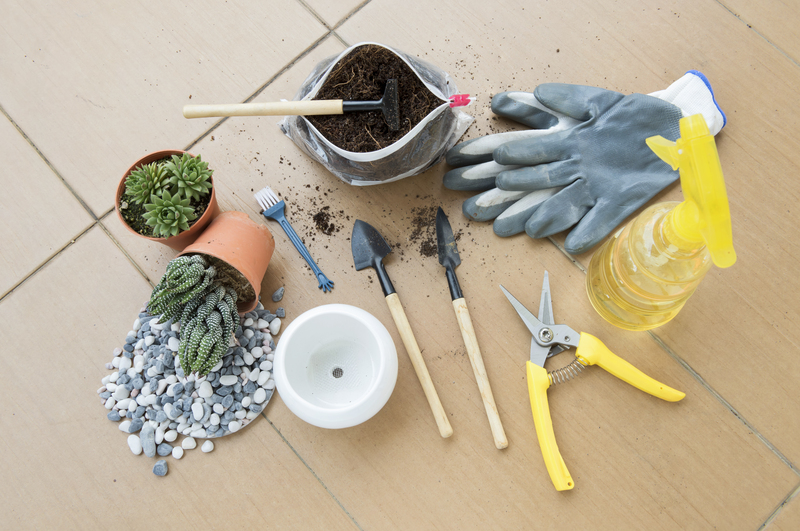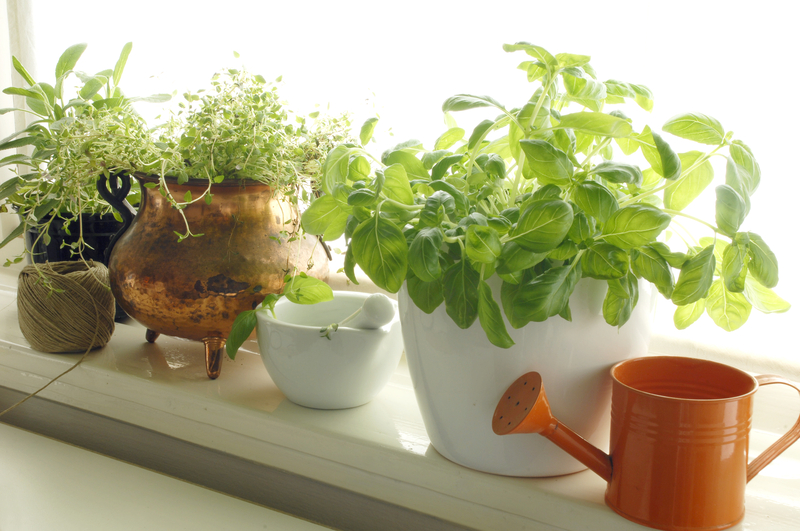Garden Like a Pro: 9 Crucial Tips for Beginner Gardeners
Posted on 17/06/2025
Garden Like a Pro: 9 Crucial Tips for Beginner Gardeners
So, you want to start a garden but don't know where to begin? No worries! Whether you're dreaming of lush flower beds or a bountiful vegetable patch, the journey to gardening success starts with the right tips. Read on to discover crucial gardening advice to help you garden like a pro and avoid common beginner mistakes. With these expert-endorsed tips, your green thumb will soon be the envy of the neighborhood.
1. Choose the Right Location
One of the keys to successful gardening is picking the optimal spot. Location matters! Here's why:
- Sunlight: Most vegetables and flowers require at least 6 hours of direct sunlight each day. Observe your yard and note which areas get the most sun.
- Accessibility: Make sure your garden spot is easy to reach for regular care and watering.
- Drainage: Avoid low-lying locations where water collects. Good drainage is essential for healthy roots.
Tip: If your space is limited, container gardening on a sunny deck or balcony can yield impressive results, too!

2. Test and Prepare Your Soil
Healthy soil is the foundation of any great garden. To garden like a professional, you must understand and nurture your soil:
- Test Your Soil: Purchase a simple soil test kit online or from a garden center. Knowing your soil's pH and nutrient levels is invaluable.
- Add Organic Matter: Improve heavy clay or sandy soils by mixing in compost, manure, or leaf mold for biodiversity and fertility.
- Remove Weeds and Debris: Clear the area of rocks, sticks, and weeds before planting for optimal growth.
Pro Tip: Well-prepared soil saves time, frustration, and money in the long run!
3. Start With Easy Plants
For beginners, nothing builds confidence like early success. Choose low-maintenance, fast-growing plants to start your gardening journey. Here are some foolproof choices:
- Flowers: Marigolds, zinnias, sunflowers
- Vegetables: Lettuce, radishes, green beans, tomatoes
- Herbs: Basil, parsley, chives, mint
These plants are resilient, forgiving and perfect for fledgling gardeners aiming to garden like a pro from day one!
4. Water Wisely
Watering seems simple, but it's one area where new gardeners often stumble. Follow these essential gardening tips for watering like a professional:
- Morning is Best: Water your garden early in the day to minimize evaporation and prevent disease.
- Deep, Infrequent Watering: Give your garden a thorough soak, less often, instead of light daily sprinkles. This encourages deep root growth.
- Avoid Wetting Leaves: Water at the base of plants to reduce fungal diseases.
Remember: Every garden site and plant will have unique water needs--observe your plants and soil to adjust accordingly.
5. Feed Your Plants
Just like us, plants require proper nutrition. Fertilizing is crucial for healthy, robust growth and vibrant blooms. Here's how to get it right:
- Read the Label: Use fertilizers--organic or synthetic--according to their instructions. Over-fertilizing can burn plants.
- Compost is Your Friend: Homemade or store-bought compost adds both nutrition and soil-improving microbes.
- Know Your Plants: Leafy vegetables love nitrogen, but tomatoes and flowers benefit from more balanced or phosphorus-rich blends.
Expert Advice: Mulching with organic materials like straw or bark chips also helps retain moisture and release nutrients slowly.
6. Embrace Mulching
If you want to garden like a professional, master the art of mulching!
- Saves Water: Mulch reduces water evaporation, lowering the need for frequent irrigation.
- Suppresses Weeds: A thick layer of mulch blocks sunlight to weed seeds.
- Improves Soil: Organic mulch breaks down, enriching your soil with every season.
Apply 2-4 inches of organic mulch around your plants, leaving space around stems to prevent rot.
7. Stay Ahead of Pests and Diseases
No matter where you garden, pests and diseases are inevitable. Proactive measures help you avoid heartbreak and lost harvests:
- Inspect Regularly: Check leaves, stems, and soil weekly for bugs or signs of disease.
- Encourage Beneficial Insects: Ladybugs and lacewings eat common pests--plant flowers to attract them!
- Choose Disease-resistant Varieties: Local nurseries can recommend resilient selections that thrive in your region.
- Remove Affected Plants Promptly: Prevent spread by pruning or discarding infected sections immediately.
Remember: Healthier plants naturally resist many problems. By following these professional gardening tips, you build their defenses!
8. Practice Smart Plant Spacing
Dense planting may look lush at first, but overcrowded plants compete for water, sunlight, and nutrients. To maximize your garden's potential as a beginner:
- Read Seed Packets: Each plant has a recommended spacing for optimal growth.
- Allow Air Flow: Good air circulation keeps foliage dry and healthy, reducing the risk of mold and mildew.
- Plan for Size: Consider both the height and width your plants will achieve at maturity. Taller plants may shade smaller crops.
By thinking ahead, you'll grow a thriving garden like a pro, avoiding common crowding issues.
9. Keep Learning and Enjoy the Process!
The best gardeners never stop learning. Embrace your mistakes and keep exploring new gardening wisdom:
- Start A Garden Journal: Document your victories, setbacks, planting dates, and weather patterns.
- Connect With Local Gardeners: Community gardens, clubs, or online groups offer invaluable advice tailored to your region.
- Read and Research: Blogs, books, and agriculture extension offices provide in-depth, science-backed gardening tips.
Above all, have fun! Gardening is a journey filled with discovery and satisfaction. Each season brings new opportunities for learning, experimentation, and success.
Bonus Tips to Garden Like a Pro
- Invest in Quality Tools: Sturdy trowels, pruners, and gloves make gardening easier and more enjoyable.
- Rotate Your Crops: In edible gardens, changing plant locations annually helps prevent soil depletion and disease buildup.
- Label Everything: Keeping plant tags or using stakes ensures you remember what you planted where!
- Practice Patience: Nature runs on its own schedule--don't rush the process, and savor every stage of growth.

Frequently Asked Questions for Beginner Gardeners
How do I start a garden as a complete beginner?
Start small. Pick a manageable area or use containers, research suitable plants for your climate, and follow the tips above for soil, watering, and feeding.
What should I plant first?
Focus on easy, resilient crops like herbs (basil, mint), vegetables (lettuce, radishes, beans), or hardy flowers (marigolds, sunflowers).
How often should I water my new garden?
Generally, water when the top inch of soil is dry. Weather, soil type, and plant species will affect frequency. Always water deeply and at the base of plants.
How do I prevent weeds without chemicals?
Mulch heavily and stay vigilant with regular hand-weeding. Healthy, thick-planted gardens naturally suppress many weeds before they start.
How can I improve poor soil?
Add compost and organic matter every season, mulch regularly, and avoid overworking the soil to preserve beneficial organisms.
Conclusion: Grow Your Confidence and Your Garden!
Starting your first garden can be intimidating, but with these 9 crucial gardening tips for beginners, you'll be well-equipped to garden like a pro from your very first season. Remember to choose the right location, prepare your soil, pick forgiving plants, water and feed wisely, mulch, manage pests, space smartly, and stay curious. Enjoy the process, celebrate the little victories, and watch your green thumb flourish!
Happy gardening--and welcome to the world of plant lovers!
Latest Posts
Balancing Garden Beauty and Canine Playtime
A Beginner's Guide to Container Gardening
Unlock the Magic of Orchids with Expert Care
Discover the Art of Garden Seating with Our Expert Guide
Effective Methods to Defend Your Garden from Harsh Weather Conditions

